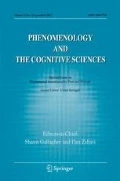Abstract
What we normally think of as the “physical world” is also the world as experienced, that is, a world of appearances. Given this, what is the reality behind the appearances, and what might its relation be to consciousness and to constructive processes in the mind? According to Kant, the thing itself that brings about and supports these appearances is unknowable and we can never gain any understanding of how it brings such appearances about. Reflexive monism argues the opposite: the thing itself is knowable as are the processes that construct conscious appearances. Conscious appearances (empirical evidence) and the theories derived from them can represent what the world is really like, even though such empirical knowledge is partial, approximate and uncertain, and conscious appearances are species-specific constructions of the human mind. Drawing on the writings of Husserl, Hoche suggests that problems of knowledge, mind and consciousness are better understood in terms of a “pure noematic” phenomenology that avoids any reference to a “thing itself.” I argue that avoiding reference to a knowable reality (behind appearances) leads to more complex explanations with less explanatory value and counterintuitive conclusions—for example Hoche’s conclusion that consciousness is not part of nature. The critical realism adopted by reflexive monism appears to be more useful, as well as being consistent with science and common sense.

Similar content being viewed by others
Notes
For the purposes of this example we are concerned only with the phenomenology of visual experiences, not with feelings about the cat, thoughts about the cat and so on.
While these views of the cat itself are numerically and perspectivally different, both S and E experience a cat out in the world, and in this respect their experiences are similar.
I suggest that phenomenal representations are “in part” constructed by the mind/brain, for the reason that I accept that the mind/brain is in turn embedded in a body, embedded in the world, so in a broader sense the phenomenal representations are constructed by the entire, interacting system.
We can of course extend the capacities of our perceptual and cognitive systems, by training or with the aid of technology. However, extending the range of our perceptual and cognitive systems does not free them of all constraints.
This point is supplementary to the classical philosophical distinction between (uncertain) contingent truth and (certain) necessary truth. Scientific knowledge can only be gained by empirical investigation because it is contingent on how the world happens to be (when it could be otherwise). Necessary truths are certain because they are true in any possible universe, so they do not require any empirical investigation.
Illusory phenomena might not represent anything real (other than the workings of the mind itself), in which case one could think of them as mental constructions which do not represent what they seem to represent. But if they are representations of the world they must tell us something about what the world is “really” like, or they are not representations of the world (in this usage, a complete misrepresentation does not count as a “representation”).
I use the neutral term “thing” as convenient shorthand here, but leave open the question of whether a given object of knowledge is better thought of as a thing, event, or process.
References
Dodwell, P. (2000). Brave new mind: A thoughtful inquiry into the nature & meaning of mental life. Oxford: Oxford University Press.
Einstein, A., & Infeld, L. (1938). The evolution of physics: From early concepts to relativity and quanta. New York: Clarion.
Hoche, H. (2007). ‘Reflexive Monism’ versus ‘Complementarism’: An analysis and criticism of the conceptual groundwork of Max Velmans’s ‘reflexive model’ of consciousness. Phenomenology and the Cognitive Sciences, 6(3). doi 10.1007/s11097-006-9045-8
Kant, I. (1978[1781]). Paralogisms of pure reason. In Immanuel Kant’s critique of pure reason, translated by N.K. Smith. London: Macmillan.
Velmans, M. (1990). Consciousness, brain, and the physical world. Philosophical Psychology, 3, 77–99.
Velmans, M. (1991a). Is human information processing conscious? Behavioral and Brain Sciences, 14(4), 651–701.
Velmans, M. (1991b). Consciousness from a first-person perspective. Behavioral and Brain Sciences, 14(4), 702–726.
Velmans, M. (1993). Consciousness, causality and complementarity. Behavioral and Brain Sciences, 16(2), 404–416.
Velmans, M. (1996). Consciousness and the “causal paradox.” Behavioral and Brain Sciences, 19(3), 537–542.
Velmans, M. (1999). Intersubjective science. Journal of Consciousness Studies, 6(2/3), 299–306.
Velmans, M. (2000). Understanding consciousness. London: Routledge.
Velmans, M. (2002a). “How could conscious experiences affect brains?” (Target article for special issue). Journal of Consciousness Studies, 9(11), 3–29.
Velmans, M. (2002b). “Making sense of causal interactions between consciousness and brain.” (reply to eight commentaries on my target article). Journal of Consciousness Studies, 9(11), 69–95.
Velmans, M. (2006). An epistemology for the study of consciousness. In M. Velmans & S. Schneider (Eds.), The Blackwell companion to consciousness. New York: Blackwell.
Velmans, M. (2007). Heterophenomenology versus critical phenomenology. Phenomenology and the Cognitive Sciences, 6(1–2). doi 10.1007/s11097-006-9033-z
Author information
Authors and Affiliations
Corresponding author
Rights and permissions
About this article
Cite this article
Velmans, M. How experienced phenomena relate to things themselves: Kant, Husserl, Hoche, and reflexive monism. Phenom Cogn Sci 6, 411–423 (2007). https://doi.org/10.1007/s11097-006-9046-7
Published:
Issue Date:
DOI: https://doi.org/10.1007/s11097-006-9046-7



